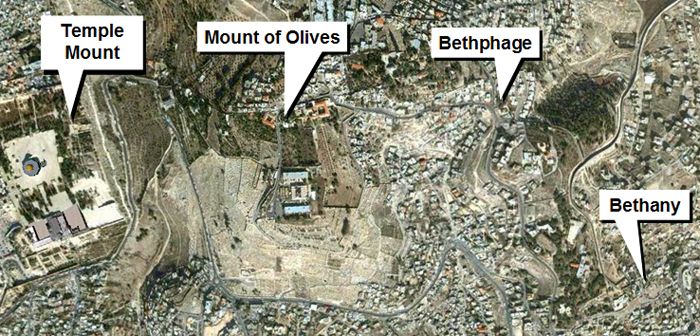The final week of Jesus’ life and ministry on earth began with celebration, jubilation, and triumph. But it wouldn’t last – because it was not what the people expected. The crowd shouting “Hosanna!” would cry out, “Crucify Him” just five days later.
They must have believed that Jesus came to assert His royal authority and reign over Israel and the other nations. But there could be no kingdom without the cross, which had to be accomplished first. The crowds didn’t understand the specifics of all the prophets, and how Christ had to be rejected and suffer – before He entered His glory.
Every move the Lord made in this world was according to prophecy and in obedience to His Father’s will. Picture the scene. The noise, the excitement, the road blanketed with coats and palm branches along the path Jesus chose leading into the eastern gate of Jerusalem. Most of the people heard of His miracles no other man had ever performed, and they wanted to claim Him as their rightful King.
[READ MATTHEW 21:1-22]
All four gospels take note of this important event when Christ rode on a donkey into the city of Jerusalem. Interesting that we read about he and the disciples walking on foot everywhere they went, and they traveled much.
But here, in preparation for His offering to God, He enters the city riding a donkey’s colt and allows people to worship Him for the very first time. As part of the prophetic “Seventy Weeks” in the book of Daniel, scholars say the date of this event was Sunday, 9 Nisan, A.D. 30, exactly 483 years after the decree of Artaxerxes mentioned in Daniel 9:24-27.
It was also prophesied by Zechariah that the King would come into His royal city this way. Matthew quotes Zechariah 9:9. The scene we are studying today saw Jesus fulfilling several prophecies at least in part.
[Turn to John 12] Just days earlier, Jesus spent time with Lazarus, Mary, and Martha. In verses 1-2, John the eye-witness writes,
…six days before the Passover, Jesus came to Bethany, where Lazarus was who had been dead, whom He had raised from the dead. 2 There they made Him a supper; and Martha served, but Lazarus was one of those who sat at the table with Him.
Then Mary anointed Jesus’ feet with very expensive perfume. Then right after Judas complained, Jesus said (vs. 7), “Let her alone; she has kept this for the day of My burial.” In her act of devotion, what might Mary have known?
The day before Passover, another crowd was getting stirred up – at Bethany.
Now a great many of the Jews knew that He was there; and they came, not for Jesus’ sake only, but that they might also see Lazarus, whom He had raised from the dead. 10 But the chief priests plotted to put Lazarus to death also, 11 because on account of him many of the Jews went away and believed in Jesus. [John 12:9-11]
So, rather than give God the glory for another amazing, miraculous sign, they plotted to kill Lazarus and Jesus! John’s gospel tells us that the very next day was Palm Sunday – when Jesus would enter Jerusalem.
In Matthew 21, Jesus instructs His disciples regarding preparations for His triumphal entry into Jerusalem. Bethpage was a small town near Bethany where they spent the night. This is its only mention in Scripture.
When they drew near Jerusalem: Jesus knew the religious leaders were going to arrest Him and condemn Him and mock Him and deliver Him to the Romans for crucifixion (Matt. 20:19). Yet He had the courage to not only enter Jerusalem, but to enter in as public a way as possible. Prior to this, He prevented people from knowing who He was and He suppressed any enthusiasm about Him being the Messiah.
Not anymore. The secrecy was being lifted. Jesus could not have chosen a more dramatic moment; Jerusalem was surging with religious expectations.
Vs. 2, “go into the village, you will find a donkey, and a colt with her: Jesus would ride upon the younger of these animals, the colt. He told the disciples how and where they would find them and to bring both. Don’t miss this foreknowledge which reveals Jesus’ divine omniscience!
The Hebrew text of Zechariah 9 mentions one animal, not two. Jesus rode on the ‘colt,’ not its mother. Mark and Luke say the animal was so young that it had never been ridden. We don’t often think about the noisy and excited crowd, and the fact an unbroken animal apparently remained calm. You have to wonder if it is because God was on its back.
Vs. 4 – All this was done that it might be fulfilled which was spoken by the prophet: Here, Jesus deliberately worked to fulfill prophecy.
Vs. 5 – Behold, your King is coming to you, lowly, and sitting on a donkey: Instead of coming to Jerusalem on a horse as a conquering general, He chose a colt, as was customary for royalty. He came to Jerusalem as the Prince of Peace.
- One commentator said this entry into Jerusalem was indeed the triumph of humility over prideand worldly grandeur; of poverty over affluence; and of meekness and gentleness over rage and malice.
Verses 7-11, Jesus receives and encourages adoration as the Messiah.
Laid their clothes on them…spread their clothes on the road; others cut down branches from the trees and spread them on the road: All this was done to honor Jesus. The act of spreading out garments on the road was one of worship, recognition of Jesus’ royalty and a promise of support.
We better get used to worship because we’ll be doing it in heaven!
After this I looked, and behold, a great multitude that no one could number, from every nation, from all tribes and peoples and languages, standing before the throne and before the Lamb, clothed in white robes, with palm branches in their hands. Revelation 7:9
If Jesus were in this room, would you worship differently? The Bible says God inhabits the praises of His people! Regarding our lack of passion in worship, Spurgeon writes: “This age does not generally sin in the direction of being too excited concerning divine things. We have erred so long on the other side that, perhaps, a little excess in the direction of fervor might not be the worst of all calamities;”
Vs. 9: Hosanna to the Son of David! This was open Messianic adoration of Jesus. They longed for deliverance & salvation (Hosanna means “save now!”) and was addressed to kings, (as in 2 Samuel 14:4, 2 Kings 6:26). They openly give Jesus the title Son of David… He who comes in the name of the LORD to fulfill Daniel’s prophecy.
“‘Hosanna’ transliterates the Hebrew expression that originally was a cry for help: ‘Save!’… In time it became an invocation of blessing and even an acclamation… Complete fulfillment will take place when Christ returns to judge and to rule. These words were quoted from a prophetic, triumphant Psalm.
Psalm 118:25-27 states:
The stone which the builders rejected Has become the chief cornerstone. 23 This was the Lord’s doing; It is marvelous in our eyes. 24 This is the day the Lord has made; We will rejoice and be glad in it. 25 Save now, I pray, O Lord; O Lord, I pray, send now prosperity. 26 Blessed is he who comes in the name of the Lord! We have blessed you from the house of the Lord. 27 God is the Lord, And He has given us light; Bind the sacrifice with cords to the horns of the altar.
When a king comes, something magnificent is typically expected. But all this rejoicing was over One who would first be bound and sacrificed. It had to be done this way and was settled by God from eternity. Again, there could be no kingdom until the work of the cross was accomplished.
Vs. 10 – When He had come into Jerusalem, all the city was moved:
In all the commotion, don’t forget Jesus knew the chief priests and Pharisees were plotting to kill Him, yet He came openly to the city as Messiah.
- When the Magi came looking for the King of Jews, ‘all Jerusalem’ was troubled (Matthew 2:3). Now when Jesus arrives all the city is stirred.
- And many who were stirred would five days later, change their hosannas to “Away with him! Crucify him!” How fickle is the mob.
- Recall in Luke 19:41-44, before Jesus entered Jerusalem, He looked over the city and wept, knowing judgment would come. They didn’t “recognize the time of your visitation” and what would bring peace.”
Just like the world and America today, some people are stirred with joy and anticipation by the thought of Jesus’ return and future kingdom. Others respond with laughter, mockery, envy or even indignation. But one cannot be neutral about the approach of the Kingdom and the person of Jesus Christ.
Vs. 11 – This is Jesus, the prophet from Nazareth of Galilee:
It would sound strange to many – especially to the religious establishment – that a prophet would come from the obscure city of Nazareth. Born in Bethlehem, the city of David, in and out of Egypt, called a Nazarene.
Vs. 12-13, Jesus cleanses, “Drove out all those who bought and sold in the temple:”
This seems distinct from the cleansing of the temple courts mentioned in John 2:13-22, which happened towards the beginning of Jesus’ earthly ministry. Many scholars believe Jesus cleared the temple twice; John mentions him making a whip and driving out people doing business and animals as well.
- Yet the purpose was the same; to drive out the merchants, who in cooperation with the priests cheated visitors to Jerusalem by forcing them to purchase approved sacrificial animals and exchange currencies at high, jacked up prices.
- A pair of doves could be nearly 20 times more expensive inside the temple. The traffic was necessary, and might have been innocent; but the trading spirit soon develops abuses; the love of money.
What Jesus did was important more as an acted-out parable than for what it accomplished in itself. One commentator stated: “There is no indication, nor is it likely, that any lasting reform was achieved; no doubt the tables were back for the rest of the week, and Jesus took no further action.”
Vs. 13 – My house shall be called a house of prayer: The merchants operated in the outer courts of the temple, the only area where Gentiles could come and pray. Therefore, this place of prayer was made into a marketplace, and a dishonest one at that.
Mark’s gospel account contains the fact that Jesus used the opportunity to teach the people in the temple; Jeremiah 7:11 states: “Has this house, which is called by My name, become a den of robbers in your sight?”
- Jeremiah and Isaiah prophesied, and Jesus demanded the temple be a place for all nationsto pray, but all the activity of all those doing business made it impossible for any seeking Gentile to come and pray.
Isaiah 56:7 states:
…these I will bring to my holy mountain, and make them joyful in my house of prayer; their burnt offerings and their sacrifices will be accepted on my altar; for my house shall be called a house of prayer for all peoples.”
The temple was where Jehovah had set His name, but it had become defiled. Jesus combined both of these O.T. verses in his remarks in Matt. 21:13.
Verse 14 – Then the blind and the lame came to Him in the temple, and He healed them.
When Jesus drove out the merchants and money changers, it didn’t discourage the needy from coming to Him. Those suffering sought Him out – and He healed them. Jesus did this countless times so why mention it here?
- The blind and the lame were restricted to the outer court of the Gentiles; they could not go closer to the temple or to the altar to sacrifice. They were not outcasts to Jesus.
Verse 15-17 – reveals the indignation of the Jewish leaders.
…the chief priests and scribes saw the wonderful things that He did, and the children crying out in the temple and saying, “Hosanna to the Son of David!” they were indignant…
This was their response to miracles of God, which they did not deny! Then there’s the children. First, notice children were IN the temple. Then see the hypocrisy of the priests and Pharisees: Greed and theft in the temple didn’t bother them, but praise to Jesus did!
The irony is that children and common people acknowledged Jesus and for that, they were despised by the educated, religious leaders. Just like this world, the more we glorify Jesus Christ, the more it rubs them the wrong way.
Verse 16 – Do You hear what these are saying? The answer was clear: Yes, He had heard what these are saying – and it was perfected praise in the ears of God. Many translations of Psalm 8:2 say, “you have ordained strength.”
• Jesus’ reply to the “indignant” chief priests and scribes amounted to a clear assertion of His deity.
• In Luke 19:39-40, they tell Jesus to rebuke His followers; Jesus replied: “if these keep silent the stones would cry out.” Plus, to say to these proud leaders, “Have you never read…?” Wow.
Vs. 17 – He left them and went out of the city to Bethany, and He lodged there: some suggest Jesus stayed with Lazarus, Martha and Mary. At the time of Passover, thousands and thousands of pilgrims crowded into Jerusalem. It was common for some to stay in the surrounding villages, and Bethany was close by.
 THE FIG TREE
THE FIG TREE
A fig tree was a well-known symbol of Israel, and on most fig trees, the fruit appears before the leaves. When Jesus came to Israel there were leaves of religion but no fruit for God. A barren fig tree often symbolized divine judgment on Israel because of spiritual fruitlessness.
Vs. 18-19 – Jesus finds no fruit on the tree and rebukes it, perhaps so he would use the occasion to work a miracle and teach a parable.
Let no fruit grow on you ever again: In a dramatic way, Jesus performed one of His few destructive miracles. His curse made the fig tree wither.
• Note that the two destructive miracles of Jesus (sending demons into a herd of pigs in Matthew 8) were not directed towards people.
Found nothing on it but leaves: The tree was a picture of false advertising, having leaves, but no figs. In this acted-out-parable, Jesus warned of coming judgment upon an unfruitful Israel. It showed God’s disapproval of people who are all leaves and no fruit. “The story is clear and simple, and its point obvious, that what counts is not promise but performance.”
John 15 – “Every branch in Me that does not bear fruit He takes away…” (read John 15:1-8 on bearing fruit and abiding in the Vine)
Matthew Henry stated: “A false and hypocritical profession commonly withers in this world; the fig tree that had no fruit lost its leaves. Hypocrites may look plausible for a time, but their profession will soon come to nothing.”
Vs. 20-21 – How did the fig tree wither away so soon? Jesus explained that this miracle was really the result of a prayer made in faith (if you have faith and do not doubt). He then encouraged His disciples to have this kind of faith, trusting that God would hear them also.
22 – And whatever things you ask in prayer, believing, you will receive
• This promise of God’s answer to the prayer of faith was made to His disciples, not to the multitude. This is a promise to those who are following Jesus, abiding in Him and bearing fruit.
• We can only believe for a thing when we are in such union with God that his thought and purpose can lead us.
This is not to be understood as an assurance that God will grant our every request or give us whatever we ask! To pray with faith is to believe in accordance with the revealed will of God. HIS will be done.
* * * *
TAKEAWAYS from today’s study (Matthew 21:1-22)
• Jesus fulfilled prophecy and obeyed the Father’s will.
• The cross had to come before the Kingdom.
• Jesus demonstrated His authority, foreknowledge, and compassion.
• When Christ s is most honored, His enemies are most displeased.
• Greed & theft in the temple didn’t bother them; praising Jesus did.
• Encourage children to know, worship Jesus; they’re watching your life.
• What counts is not promise but performance, bearing fruit for Him
• Believe! Pray in faith according to the will and purposes of God.

